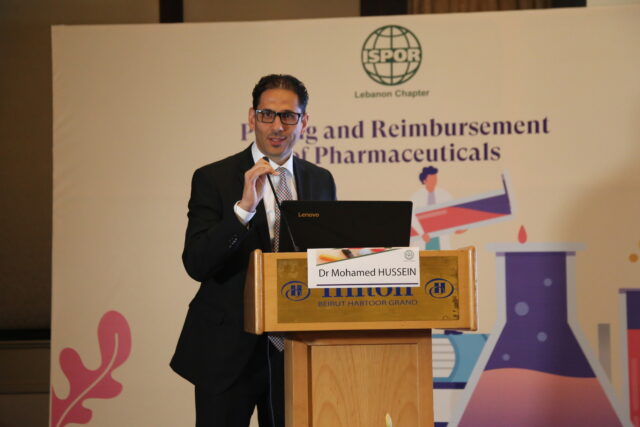The CCHO team attended the 2-day Professional Society for Health Economics and Outcomes Lebanon Chapter (LSPOR) educational workshop during February 2019 at the Hilton Habtoor Grand Hotel. The meeting was titled Pricing and Reimbursement for Pharmaceuticals and sought to gather healthcare leaders to discuss new discoveries in health technology and market access challenges.
The workshop was aimed at a target audience of policy makers, regulators, researchers, academicians, payers, and decision makers in the public and private sectors, pharmaceutical and biotech companies, and consultancy firms.
The goal of this workshop was to examine the health system and different health coverage schemes in the region in comparison to other reference countries. The structure of reimbursement bodies was discussed in the public and private sectors and the health services funding categories. The conversation shed light on the legislation and the main task of health coverage funds while discussing the financing of health services, risk pooling, sources of funding, financing intermediaries, distribution among providers, and basis of health products pricing. Other discussions focused on value-based pricing and innovation across Europe, pricing structure in Lebanon, pricing and market access challenges for payers in Europe and local considerations in Lebanon and pricing and reimbursement policies in Europe.
CCHO sponsored a presentation titled, Pricing and Market Access Challenges for Payers in Lebanon with speakers Dr. Mohamad Hussein, Chairman of the Department of Biostatistics and Bioinformatics at the King Abdullah International Medical Research Centre in KSA and Dr. Nada Ghosn, PhD.
Dr. Hussein began the presentation by asking the question, “How Much to Pay?” and discussing how this question is answered within the healthcare sector. Firstly, he examined methods such as budget impact models and cost effectiveness analysis, before addressing the problem of lack of pharmacoeconomic guidelines in the region. Next, he emphasized the importance of data when it comes to developing a budget impact model by discussing sources of data and the issues faced in retrieving data in Lebanon, such as lack of national surveys. He also discussed the retrieval of the treatment pathway, which further highlights the need for local data as using a different country’s data can undermine the model, causing the reimbursement to fail. Finally, he noted that administrative data claims databases can be a source of information. Dr. Hussein also explained that data availability also depends on the location, since some countries have more data available than others.
Afterwards, the floor was yielded to Dr. Nada Ghosn, who discussed cancer registries, such as the National Cancer Registry (NCR) of Lebanon, that collects data on all new cancer cases to measure cancer incidence. She then discussed the systematic methodology of NCR, which includes several steps, such as data collection, data cleaning, and data analysis. The data is then published on the MOPH website and national reports where the results can be compared with other countries. Dr. Ghosn ended her discussion by urging the improvement of data quality to obtain complete data and update staging data entry.






